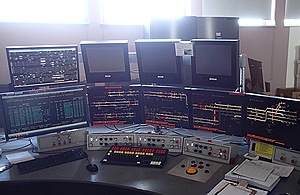Report 03/2020: Class investigation into human performance in signalling operations
RAIB has today released its class investigation into factors affecting safety-critical human performance in signalling operations on the national network.

Example of a signalling centre with computer workstations
Summary
Since it became operational in 2005, RAIB has investigated numerous incidents in which signaller decision-making has been pivotal, and where the safety of the railway system was heavily dependent on those decisions (that is, scenarios in which there were no, or limited, engineered safeguards). Under its remit, RAIB also collected industry data on several similar incidents over a five-year period which again highlighted the vulnerable nature of such decision-making. In the light of these incidents, we undertook a class investigation into what affects those decisions, recognising that they may be influenced by a variety of systemic factors. Although this investigation is about what can go wrong, it must be recognised that front-line decisions also contribute much more widely to the safe operation of the railway on a daily basis.
The investigation examined five categories of incident:
-
user worked crossing irregularities
-
line blockage irregularities
-
users trapped at CCTV level crossings
-
irregularities involving level crossings on local control
-
other operational irregularities
The investigation identified several common factors influencing the actions of signallers across these scenarios, associated with:
-
signaller workload
-
user-centred design
-
competence management
-
experiential knowledge
-
organisational structure
The report also observes that Network Rail’s incident investigations do not always fully exploit the opportunities to learn from these incidents.
Recommendations
As a result, RAIB has made six recommendations to Network Rail, addressing each of the five areas listed above as well as the observation on learning from incident investigations. There is also a learning point for incident investigators relating to the identification of systemic causal factors.
Simon French, Chief Inspector of Rail Accidents said:
“The decisions made by signallers have an immediate, vital impact on the safety of people using the railway. Whether giving a level crossing user permission to cross the line, or making sure that track workers are protected from the approach of trains, a good decision by the signaller is often the last line of defence against tragedy.
“It’s easy for an outsider to assume that on the modern railway, everything to do with signalling trains is automatic, fail-safe, and relies on the latest technology. While there is a huge amount of complex hardware and software out there, supported by thousands of engineers and technicians, many decisions about everyday operations are still down to the human beings who operate the system.
“RAIB has been concerned for some time about this decision-making process, and how the performance of signallers can be affected by multiple, systemic factors that are within the control of railway management. As the railway has got busier, so the demands on the signaller have increased. Much of what signallers deal with – mostly successfully – is down to experience and implicit knowledge, but current processes don’t recognise this.
“When, rightly, managers seek to reduce the amount of work on the track that is done while trains are running, the burden on the signaller, to block the line so that work can take place, increases. When trains get faster, so that it’s no longer possible for users of private level crossings to rely on seeing them approaching in time to be able to cross safely, the signaller has to respond to more telephone calls asking for permission to cross. As the areas supervised by signallers get larger, many more level crossing users, and track workers, are phoning up during each shift. It’s asking a lot of signallers to always make the right call, and we have found that the support they need isn’t always there.
“We are recommending that Network Rail looks closely at how it manages the day-to-day work of signallers. The experience and knowledge of signalling staff is a vital asset, and needs to be properly and consistently developed, supported and made use of, for the safety of everyone who interacts with the railway.”
Notes to editors
- The sole purpose of RAIB investigations is to prevent future accidents and incidents and improve railway safety. RAIB does not establish blame, liability or carry out prosecutions.
- RAIB operates, as far as possible, in an open and transparent manner. While our investigations are completely independent of the railway industry, we do maintain close liaison with railway companies and if we discover matters that may affect the safety of the railway, we make sure that information about them is circulated to the right people as soon as possible, and certainly long before publication of our final report.
- For media enquiries, please call 01932 440015.